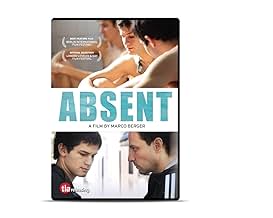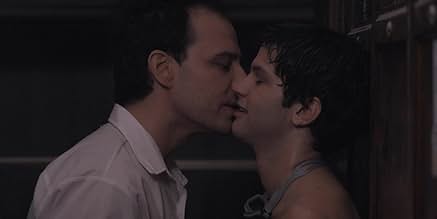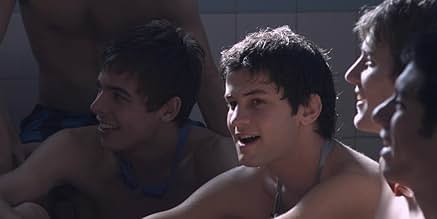IMDb RATING
6.3/10
2.8K
YOUR RATING
An ambiguous relationship develops between a swimming instructor and one of his students.An ambiguous relationship develops between a swimming instructor and one of his students.An ambiguous relationship develops between a swimming instructor and one of his students.
- Awards
- 2 wins & 2 nominations total
Carlos Echevarría
- Sebastián
- (as Carlos Echavarría)
Joan Alsina
- Alumno 2
- (as Juan Alsina)
Laura Dozo
- Oftalmóloga
- (as Laura Dozzo)
Fiamma Boldessarini
- Profesora 3
- (as Fiamma Boldossarini)
- Director
- Writer
- All cast & crew
- Production, box office & more at IMDbPro
Featured reviews
Hey, boys and girls! Your new word for the day is "auteur".
An auteur is an artist with a distinctive approach, usually a film director whose filmmaking control is so unbounded and personal that the director is likened to the "author" of the film, thus manifesting the director's unique style or thematic focus.
You can look at a minute of film and know instantaneously if it was made by Alfred Hitchcock. Or Federico Fellini. Or Fritz Lang. Or Agnes Varda. Or Stanley Kubrick. Or Jean-Luc Godard (yowza!).
Marco Berger is an auteur. At the age of 47 (as of August 2025) he has written and directed nine feature films, collaborated on two more, and has just finished his 10th solo feature for release this year.
Yes: I own them all. My personal favourite (so far) is the gloriously lyrical "Hawaii", which may be the single most romantic film ever made.
He established his style and trademarks early on: he takes his time, but there is something to see in every shot no matter the duration; he concentrates on the relationship of two leading characters, or two at a time when there are many more; his screenplays are rich and hilarious when called for, or quiet (sometimes disturbingly so) and introspective, but he only lets you hear what is necessary to hear; he uses colours wisely; his use of music is superb (and has, to date, worked with the same composer on all of his films). He finds utter beauty in the most ordinary-looking men (yes, he is an openly queer director, and his sexual identity finds its way into most - but not all - of his films).
"Ausente", his second feature film, has taken quite a beating here. Why is that? Did you want to see Sebastián fall for Martín's advances? Did you not see or feel the tension between these two characters? Did you not feel Sebastián's grief, not only over Martín's fate but also over how he treated him?
So shut off your Smartphone, chill out, and screen it again and listen and watch closely: is the unexpected death an accident or suicide? And those last shots: fantasies? Memories?
I find it to be a film of almost overwhelming suspense, and, ultimately, profoundly moving.
P. S. It won the Teddy Award for Best Feature Film at the Berlin International Film Festival.
An auteur is an artist with a distinctive approach, usually a film director whose filmmaking control is so unbounded and personal that the director is likened to the "author" of the film, thus manifesting the director's unique style or thematic focus.
You can look at a minute of film and know instantaneously if it was made by Alfred Hitchcock. Or Federico Fellini. Or Fritz Lang. Or Agnes Varda. Or Stanley Kubrick. Or Jean-Luc Godard (yowza!).
Marco Berger is an auteur. At the age of 47 (as of August 2025) he has written and directed nine feature films, collaborated on two more, and has just finished his 10th solo feature for release this year.
Yes: I own them all. My personal favourite (so far) is the gloriously lyrical "Hawaii", which may be the single most romantic film ever made.
He established his style and trademarks early on: he takes his time, but there is something to see in every shot no matter the duration; he concentrates on the relationship of two leading characters, or two at a time when there are many more; his screenplays are rich and hilarious when called for, or quiet (sometimes disturbingly so) and introspective, but he only lets you hear what is necessary to hear; he uses colours wisely; his use of music is superb (and has, to date, worked with the same composer on all of his films). He finds utter beauty in the most ordinary-looking men (yes, he is an openly queer director, and his sexual identity finds its way into most - but not all - of his films).
"Ausente", his second feature film, has taken quite a beating here. Why is that? Did you want to see Sebastián fall for Martín's advances? Did you not see or feel the tension between these two characters? Did you not feel Sebastián's grief, not only over Martín's fate but also over how he treated him?
So shut off your Smartphone, chill out, and screen it again and listen and watch closely: is the unexpected death an accident or suicide? And those last shots: fantasies? Memories?
I find it to be a film of almost overwhelming suspense, and, ultimately, profoundly moving.
P. S. It won the Teddy Award for Best Feature Film at the Berlin International Film Festival.
This is not a review for this particular film, rather a guide for those who would like to watch it. Marco Berger (the director) is notorious for his slow-paced films with very simple and thin plots, and "Absent" is not an exception. Before trying this one, please get familiar with his cinematic style by watching his other works such as Hawaii (his best and easiest one to watch), Taekwondo and The Blonde One. After that you may appreciate this film more. I didn't rate it high but I think it's worth a try if you want something refreshing.
I have just finished watching Marco Berger's "Ausente", and in spite of the Teddy award it won at the Berlin International Film Festival as Best Film with LGBT topic, I confess that all the enthusiasm that I felt when I saw "Plan B" vanished. All the freshness and sensuality of Berger's first motion picture, with actors who seemed to be improvising scenes and lines (or maybe they were really doing it) to give us a sincere reflection on how to reach honest acceptance of our homo-erotic feelings, was here replaced by a flow of contrived, too coldly calculated movements, to create a melodrama (not in the best tango tradition, but more in a soapy middle class mold) which is often more corny than moving. The story of a professor's harassment by his adolescent student, who is trying to seduce his teacher with lies, is slowly displaced by a subplot that pays too much attention to public opinion, prejudice, fear and slander, that is probably more in the mind of the instructor, who in the end is not as transparent as he had thought. Although Berger still favors setting up his camera at the level of men's crotches in underwear while lying in bed, this time those shots seem tamed as he was too much assimilated (perhaps far too much) by the discreet charm of the Argentinean film industry and its frequent pomp (careful, I do not mean the other Argentinean cinema, so independent and liberating- and without Ricardo Darín in the leading role, of course!), with sugary music that even includes a little female voice doing "Aaahhh's" Both Carlos Echevarría as the professor and Javier de Pietro as the student are good, given the material they had to work with.
After watching "The Blond One" (EXCELLENT) and "Hawaii" (VERY GOOD) ...this movie is just "so so." I feel giving it a higher rating would be an insult to Marco's other films.
I don't know what's worst: the casting, the acting or the pointless story.
I have watched Marco Berger's Hawaii, his two short stories and Plan B. In that order, so I have watched enough to know that in his works there are always obligatory shots of men's crutches and long quiet scenes...it works in everyone but "The clock" (his first work). So I knew this one was going to have that but I was not expecting terrible actors with no chemistry whatsoever and that includes the secondary actors (terrible teachers) and the insufferable girlfriend. Am I suppose to think the couple love each other? There is no real connection between the actors. And don't get me start about Martin. Am I suppose to root for this lying manipulative tool? Because I don't care about him and his terrible lessons about butterflies (that was painful to watch). I guess the moral of the story is indulge yourself and give the teenage psycho what he wants instead of acting like an adult...what was Sebastian supposed to be sorry for? The only stupid thing he did was being stupid enough not to see that kid was (poorly) lying all along.
I have watched Marco Berger's Hawaii, his two short stories and Plan B. In that order, so I have watched enough to know that in his works there are always obligatory shots of men's crutches and long quiet scenes...it works in everyone but "The clock" (his first work). So I knew this one was going to have that but I was not expecting terrible actors with no chemistry whatsoever and that includes the secondary actors (terrible teachers) and the insufferable girlfriend. Am I suppose to think the couple love each other? There is no real connection between the actors. And don't get me start about Martin. Am I suppose to root for this lying manipulative tool? Because I don't care about him and his terrible lessons about butterflies (that was painful to watch). I guess the moral of the story is indulge yourself and give the teenage psycho what he wants instead of acting like an adult...what was Sebastian supposed to be sorry for? The only stupid thing he did was being stupid enough not to see that kid was (poorly) lying all along.
- How long is Absent?Powered by Alexa
Details
- Release date
- Country of origin
- Official sites
- Language
- Also known as
- Ausente
- Filming locations
- Production companies
- See more company credits at IMDbPro
- Runtime
- 1h 31m(91 min)
- Color
- Sound mix
- Aspect ratio
- 1.85 : 1
- 16:9 HD
Contribute to this page
Suggest an edit or add missing content




























